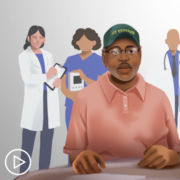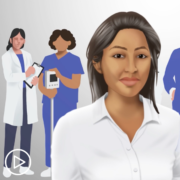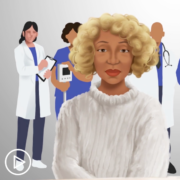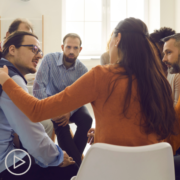Small Cell Lung Cancer Care | Communication As a Key
Small Cell Lung Cancer Care | Communication As a Key from Patient Empowerment Network on Vimeo.
Dr. Lin is a medical oncologist who helps small cell lung cancer (SCLC) patients as a member of the healthcare team. Dr. Lin explains the urgency of care decisions with extensive stage SCLC and advice to patients and loved ones. “This is where communication between the patient and healthcare team is key to an optimal cancer journey.” She discusses common members of the SCLC healthcare team and advice for staying [ACT]IVATED for the best care.
Disclaimer: Thank you to small cell lung cancer expert Dr. Rafael Santana-Davila, PEN’s Empowerment Leads, patients, and care partners for reviewing and collaborating on this video. This video has been edited to protect the privacy of certain individuals, and the names and identifying details have been changed.
See More from [ACT]IVATED Small Cell Lung Cancer (SCLC)
Related Resources:

|

|

|
Transcript:
Staying ACTIVATED in cancer care is essential to becoming informed, empowered, and engaged in patient care, but what does that really look like? As a medical oncologist caring for patients facing a small cell lung cancer (SCLC) diagnosis, how can I best coordinate with my patients and families in the shared decision-making process?
Extensive stage small cell lung cancer (ES-SCLC) is an aggressive cancer, so swift decisions may be necessary. This is where communication between the patient and healthcare team is vital to an optimal cancer journey. Your healthcare team may include a medical oncologist like myself, pulmonologist, radiation oncologist, thoracic surgeon, nurse practitioners, a patient navigator, and many more key players on your journey.
Given the aggressive nature of this cancer, educating yourself as the patient and patient’s loved ones helps empower involvement in the shared decision-making process for small cell lung cancer treatment and care. Asking lots of questions about benefits and risks of treatment, testing, what to expect for treatment, and support services is an important part of the patient empowerment path.
Stay [ACT]IVATED with these tips:
- Ask about the stage of your cancer, treatment options, treatment goals, possible side effects, support services, and what to expect during and after treatment.
- Inquire about how often you’ll see your pulmonologist as part of your care, whether there are any clinical trial options, or who to contact if you experience any type of lung discomfort or breathing issues.
- Find out what to expect for your treatment, the frequency, duration, side effects, and whether you might need help going to and from the treatment location.
If you’re helping a loved one in their fight against small cell lung cancer, shared decision-making is critical. Stay [ACT]IVATED by being informed, empowered, and engaged in their care. It can make all the difference.
Share Your Feedback:
Create your own user feedback survey






